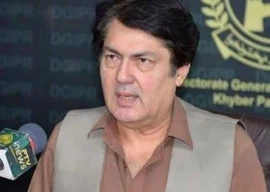
“In a democracy, people have the right to criticise judges. Why then should there be a Contempt of Court Act, which to some extent prevents people from criticising the judiciary?” Katju had told a convention held at the Indian Society of International Law years ago, when he was a serving judge. The same lecture was also published as an article in the Indian newspaper, The Hindu, titled ‘Contempt of Court: Need for a Second Look.’
Pakistan’s judiciary, evidently, does not share the same opinion as a number of high-profile contempt cases involving federal ministers, businessmen and other politicians are currently pending in the Supreme Court.
Katju maintains the basic principle of a democracy is that the people are supreme. Thus, all authorities – be they judges, legislators, ministers or bureaucrats – are servants of the people. “Surely, the master has a right to criticise his servants if they do not act or behave properly.”
In a democracy, the purpose of resting the power to prosecute for contempt is only to enable the court to function, he said. “The power is not to prevent the master (people) from criticising the servant if the latter does not function properly,” Katju continued with his metaphor.
Katju added that the best shield of armour for a judge is his integrity, impartiality and knowledge. “An upright judge will hardly ever need to use the contempt power. A judge should have the equanimity and inner strength to remain unperturbed in any situation.”
“Much of our contempt law is a hangover from British rule, under which India was not free and democratic. How can the law of those days be applicable today?”
However, he agrees the law is useful, and even necessary in certain situations. “If someone jumps up on the dais of the court, runs away with a court file, or threatens a party or witness,” the law will help protect the court’s sanctity, he said.
The view about having this contempt power was first introduced by Wilmot J in England in 1765 in a judgment that was, in fact, never delivered. Katju is of the opinion that in a monarchy the judge actually exercises the delegated functions of the king, and requires the dignity and majesty a king must have to command such obedience.
He feels the subcontinent should adopt a fresh and modern democratic approach similar to that of England and the United States where contempt jurisdiction is very sparingly exercised. “A judge is not bound to take action for contempt, even if contempt has, in fact, been committed.”
Published in The Express Tribune, 25th, 2012.
COMMENTS (16)
Comments are moderated and generally will be posted if they are on-topic and not abusive.
For more information, please see our Comments FAQ
1725612926-0/Tribune-Pic-(8)1725612926-0-405x300.webp)






1725254039-0/Untitled-design-(24)1725254039-0-270x192.webp)
1732189200-0/Express-Tribune-(13)1732189200-0-270x192.webp)








ET is still moderating my comment; okay i'll say differently. what i mean is by publishing articles which unnecessarily hurt feelings of majority who in turn hit back the authors with their comments, who served people with great honesty.. which is not all called for..
Judges must be able to enforce their decisions and vindicate the authority of courts by punishing those who disobey judicial orders. Without the authority to force compliance with their orders, courts would be merely advisory and could not function. If the Exceutive per se disobey's a judicial order then how should that be remedied?
The whole Freedom of expression/speech concept is fake and does not make any sense. I cannot curse anyone to hurt his feelings just because I have this so called freedom. One has to be in limits. There is no such thing as absolute freedom. Its mainly used to bash religions and promote immorality.
In my opinion the contempt of court law should be limited to the penalty for disobedience and not for criticism of verdict and judges. Judges suppose themselves to be angels and above law which they are not. Every body is "honourable" not only they. The basic principle of accountablity is that it should be done by others. At present, there is no forum in place for the accountability of judges. The so called Supreme Judicial Council was buried in the final days of Gen Mush by Ramdey, the best friend of Iftikhar under the ruse of being mala fide. When it is in the constitution then why you didn't let the case of Iftikhar go to the SJC. It means that by obstructing the due course of law his own intentions were mala fide. So, the ultimate question is that if the bias is floating on the surface (law is unambiguous and crystal clear about the immunity of the president) where one should go?
Laws are implemented by the power invested in different state organs. Mr Gilani was found to be in violation of a court order. Thus the reason for him to bear the consequences of his refusal.
From now on using, the inherent logic advocated by Justice Katju, I refuse to stop at the red light on traffic crossings, as some of the traffic policemen have been reported to have taken bribes.
I think it is approrpiate to involke contempt of court for failure to implement lawful court orders. (Gilani's case is questionable because the ineherenyt order was not lawful). Secondly, it is inappropriate to invoke contempt of court for criticizing judges or judicial decisions in a democracy (the point Mr. Katju had made). Here too the current Pakistani CJ has invoked contempt of court against a real estate mogul and some media personalities because they spoke against the judge. Those people may not be great but they DO have a rigt to their opinion and it is abuse of authority to invoke contempt of court proceeding in a case where one of the parties is CJ's own son.
And that's how India ended up with more than $500 Billion of it's money overseas through corruption, with judges like these who couldn't act.
In a democracy it's probably more appropriately considered a "don't be an insufferable douche bag in the courtroom" rule. Which doesn't equal disagreement. It's more like if you start getting the undeniable feeling that slapping the person is the right course of action, they're probably guilty of it.
I agree with this judge on the Contempt of Court rule. It is an anachronism. Judges cannot be relied upon not to misuse it. It should be removed.
I support this judges stance against the rule on Contempt of Court, it is an anachronism. The judges cannot be relied upon to desist from misusing it. It should be removed.
Democracy should not not have any space in case of serving justice. If there is no contempt of court act then imagine for every court verdict there will be criticism then imagine where the judiciary system goes politicians and businessmen and common people start criticizing, accusing, showing disrespect to verdicts?.
I do agree with him, BUT, that only work in a democracy. Is Pakistan a democracy? No.
Absolutely. 100% correct. I always felt uncomfortable whenever I came across the contempt cases. In fact, it felt like a dictatorship. But I just couldn't put it in words.
This doesn't mean completely do away with the law. Because, that would lead to mad slinging by self serving people, especially the media.
These laws should be thoroughly re-looked at.
But there is a contempt of court act in India. just cause Justice Katju doesnt like it doesnt mean its wrong. Are we now supposed to consider a sole Indian judge a great expert on law and that our courts should listen to him.
Et at itagain. Flogging a dead horse here!